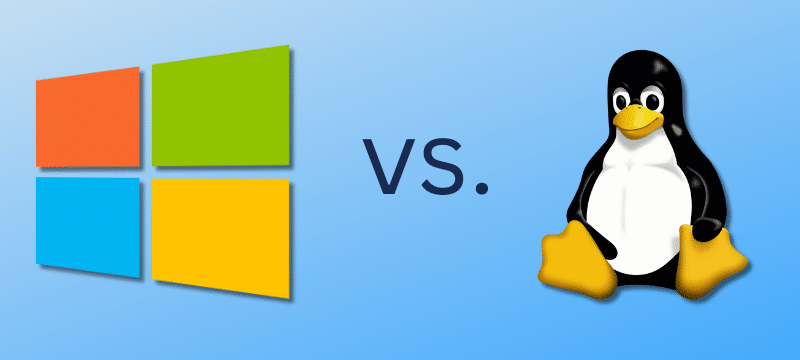Windows VPS vs Linux VPS: Which is Right for You?
Startups

One of the many great features of a virtual private server (VPS) is the control it gives you over your server environment. This control includes the ability to install and run various operating systems, full root access, and the freedom to install complex software. One of the first decisions you’ll be faced with as you configure your VPS server is which operating system to use. The choices fall under two general categories: Windows, a widely used operating system developed by Microsoft, or Linux, an open-source environment that supports distributions like Ubuntu, Debian, and CentOS.
This guide will walk you through the features of Windows and Linux for your VPS server. You’ll be choosing between the Windows environment that almost everyone is familiar with, a great choice if you’re running Windows-specific applications or if you prefer a user-friendly interface. If you choose a Linux-based operating system, you’ll get a more lightweight and cost-effective solution. You might go in this direction if you’re dealing with web development, server management, or any task that thrives in a command-line environment.
Let’s dig deeper into each option’s particular strengths, disadvantages, and other considerations, so you can make the best choice for your needs.
Key Differences Between Windows VPS and Linux VPS
1. Control panel options: Windows servers typically use Plesk or a Windows-based control panel, which supports Windows-specific applications and services. Linux servers often use cPanel or Webmin, which is favored in the Linux community for their efficiency and extensive customization options.
2. Performance and stability: Linux is often praised for its stability and performance under heavy loads. It uses fewer system resources than Windows, which can translate into better performance for applications that do not require Windows-specific technologies.
3. Security: Both platforms can be secured, but the approach and tools differ. Linux is often considered more secure out of the box. However, Windows has made significant strides in security with its recent versions. The real difference frequently comes down to the administration and maintenance practices.
5. Compatibility: Windows VPS is essential for using technologies such as ASP.NET, MSSQL (Microsoft SQL Server), or other Microsoft-centric technology. A Linux VPS is more suitable for technologies like PHP, Ruby, or MySQL, due to its extensive support and compatibility with open-source technologies.
6. Cost: Windows VPS hosting is generally more expensive than Linux VPS hosting. This is partly because Windows software requires licensing fees. If cost is a significant factor and you do not require Windows-specific software, Linux might be the better choice.
What are the Advantages to Using Windows?
Integrated development environment (IDE) support: Windows VPS supports powerful IDEs like Visual Studio, which offers robust tools for developing applications in languages such as C#, VB.NET, and ASP.NET. This can significantly speed up development and debugging processes.
Framework compatibility: Windows servers provide native support for the .NET framework, which is crucial for businesses relying on this environment for application development.
Ease of use: The familiar Windows interface and management tools make it easier for developers accustomed to Microsoft products to manage their server environments effectively.
What are the Disadvantages to Using Windows?
Cost: Licensing fees for Windows software and related development tools can add up, making it a more expensive programming option than Linux.
Less flexibility: While Windows offers a user-friendly environment, it typically does not provide the same level of access and control as Linux, which can limit custom script and automation capabilities.
What are the Advantages to Using Linux?
Open-source tools: Linux supports open-source programming languages and tools, such as Python, Perl, Ruby, and PHP. These languages and tools are free to use and widely supported by the developer community.
Customization: Linux VPS provides greater flexibility for server customization. Developers can modify nearly every aspect of their environment, from kernel tweaks to system libraries, which is crucial for optimizing performance or developing applications.
Scripting and automation: Linux excels in scripting and automation. Its native support for powerful shell scripting and task automation tools like Bash and Cron allows developers to streamline and automate many server management tasks effortlessly.
What are the Disadvantages to Using Linux?
Steep learning curve: Linux can present a steep learning curve for those not familiar with Unix-like environments. The reliance on command-line operations and configuration files can be daunting for newcomers.
Less direct support: Linux does not natively support Windows-based software and frameworks like .NET without additional software layers, such as Mono, which might not always provide complete compatibility or the same level of performance as a native Windows environment.
Making Your Choice
Choosing the right option will depend on your individual requirements and preferences. If you are going to regularly need technical assistance, Windows is probably the way to go, as Microsoft offers professional support. A Linux server will have you spending more of your own time troubleshooting, although there is an active global community of users and developers to help you.
If you’re an experienced developer seeking the exhilaration of a completely customized server for heightened performance and functionality, Linux is for you. If you need the familiarity of a user-friendly interface, your budget has some flexibility, and your hosting software portfolio consists mostly of Microsoft-based or compatible applications, Windows is the best choice.
Conclusion
Choosing between a Windows VPS and a Linux VPS often depends on specific needs and preferences. Each has unique strengths: Windows for its seamless integration with Microsoft products and user-friendly environment; Linux for its robust performance, security, lower costs, and superior programmability features. Be careful not to limit yourself to your current size and scale. Think strategically about the future, so you can avoid the complex and resource-intensive endeavor of switching platforms later.
Whether you are running a resource-heavy application that needs the reliability and customizability of Linux or a business deeply integrated into the Microsoft ecosystem requiring the compatibility of a Windows server, the right choice of VPS can significantly influence your operational efficiency and success. Choose wisely, and you will be rewarded with exceptional performance, faster decision-making, and the all-around best server for your applications.


